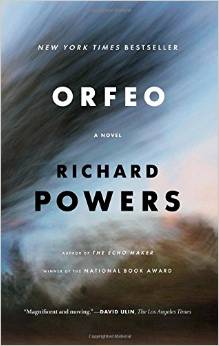 At Robert Carl’s urging I finally read Richard Powers’s novel Orfeo. He told me it was a lifelike novel about a composer, but it’s more than that: I think just to understand the novel you’d have to be a composer, or at least an inveterate new-music fan, because the contemporary music references fly thick and fast. One whole long scene takes place within a played recording of Steve Reich’s Proverb. The protagonist, Richard Els, is a composition professor who studied at the University of Illinois in the 1960s, and actual people I knew like Ben Johnston, Sal Martirano, and James Tenney make cameos as characters. Cage is quoted frequently. I don’t want to review the book, except to say that it is indeed a gripping read. But I do want to quote two passages that show how elegantly Powers limns the trajectory of a composer’s life within the vicissitudes of aesthetic fashion. The first is a scene from Els’s early college period:
At Robert Carl’s urging I finally read Richard Powers’s novel Orfeo. He told me it was a lifelike novel about a composer, but it’s more than that: I think just to understand the novel you’d have to be a composer, or at least an inveterate new-music fan, because the contemporary music references fly thick and fast. One whole long scene takes place within a played recording of Steve Reich’s Proverb. The protagonist, Richard Els, is a composition professor who studied at the University of Illinois in the 1960s, and actual people I knew like Ben Johnston, Sal Martirano, and James Tenney make cameos as characters. Cage is quoted frequently. I don’t want to review the book, except to say that it is indeed a gripping read. But I do want to quote two passages that show how elegantly Powers limns the trajectory of a composer’s life within the vicissitudes of aesthetic fashion. The first is a scene from Els’s early college period:
In the sixth week of his twentieth century formal analysis class, he arrived breathless over the previous night’s performance of Barber’s Hermit Songs. The class hooted. A stunned Els appealed to the professor.
It’s a great piece, don’t you think?
The man stifled his amusement and looked around for the hidden camera. Sure, if you still dig beauty.
Els sat through the session humiliated. He raged against the man at the grad student Murphy’s happy hour, but no one backed him up. When he checked out a recording of Hermit Songs from the music library the following week, he found them banal and predictable.
He’d learn the truth from Thomas Mann later that semester: Art was combat, an exhausting struggle. And it was impossible to stay fit for long. Music wasn’t about learning how to love. It was about learning what to disown and when to disown it. Even the most magnificent piece would end up as collateral damage in the endless war over taste. [pp. 90-91]
Later in the book, several decades later in Els’s life, he’s giving a composition lesson to a precocious student named Jennifer, a lesson described so realistically in its details that I felt like Powers had been watching secret videos of lessons I’ve given:
Jen’s duet swings upward into a sequence of stunning chords before settling into a cantabile. Then the cantabile broadens. He once put something similar into an ancient octet – the apprentice piece that won him the chance to work with Matthew Mattison. Back then he still clung to the vestiges of Neo-Romanticism. Now Neo-Romanticism, unkillable vampire, is back with a vengeance. His student outpouring was reactionary, anachronistic; Jen’s is hip and current. Other than that, the gestures are much the same. [p. 316]
Sure-fire Christmas gift for the composer in your life.
